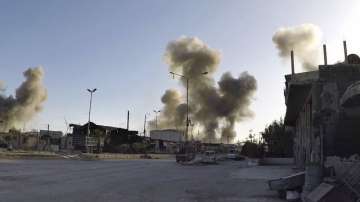Chemical weapons watchdog to send inspectors to Syria's Ghouta
The OPCW, in its statement, said its technical Secretariat has asked the Syrian government to make the necessary arrangements for the deployment of a fact-finding mission.

The international chemical weapons watchdog said Tuesday it will send a fact-finding mission to the Syrian town where a suspected gas attack took place over the weekend, after receiving a request from the Syrian government and its Russian backers to investigate the allegations.
In a statement, the Organization for the Prohibition of Chemical Weapons said a fact-finding team is “preparing to deploy to Syria shortly.”
It was not immediately clear whether the announcement would avert US military action against Syria. President Donald Trump has vowed to respond “forcefully” to Saturday’s attack on civilians in the town of Douma, in the eastern Ghouta suburbs, and warned that Russia — or any other nation found to share responsibility — will “pay a price.”
Trump on Tuesday cancelled plans to travel to South America later this week, choosing to stay in the United States to manage the response to the events in Syria.
Also read | Donald Trump cancels Latin America trip to focus on Syria
Syrian government forces were on high alert and taking precautionary measures Tuesday at military positions across the country amid fears of a US strike in the aftermath of the attack near Damascus.
The OPCW, in its statement, said its technical Secretariat has asked the Syrian government to make the necessary arrangements for the deployment of a fact-finding mission. The group is the implementing body for the Chemical Weapons Convention of 1997, which has been signed by 192 member states.
Syria became a member in 2013 as part of a deal brokered by the U.S. and Russia after a chemical attack in eastern Ghouta killed hundreds of people. That attack was widely blamed on government forces, who denied responsibility.
Syrian opposition activists and paramedics said at least 40 people were killed in last weekend’s suspected chemical attack and blamed the government. The Syrian government and its Russian backers strongly deny the allegations, and have questioned whether a chemical weapons attack took place.
Earlier Tuesday, Syria invited the OPCW to send a fact-finding mission to Douma, the last rebel stronghold in the eastern Ghouta suburbs. The Foreign Ministry said in a statement that the government will help the watchdog investigate the alleged attack.
U.N. Secretary-General Antonio Guterres said Tuesday he is outraged by the reported attack, and that the use of chemical weapons would be a violation of international law. He also reaffirmed his support for an OPCW investigation.
A senior Russian lawmaker said Tuesday that Moscow is willing to help arrange an OPCW visit to the site of the suspected attack. Yevgeny Serberennikov, from the defense committee at the Federation Council, told the RIA Novosti news agency that Russia is eager for the OPCW to “finally start carrying out the functions it was created for.”
Also read | Several feared dead in missile attack on Syrian air base; US denies it fired them
Asked in Berlin whether she supports the idea, German Chancellor Angela Merkel responded unenthusiastically, saying that “the evidence that chemical weapons were used there is very, very clear.”
A Syrian air base was struck by missiles a little more than 24 hours after the alleged chemical attack, an airstrike that Syria and Russia have blamed on Israel. Israel does not typically comment on its operations in Syria, and it is unclear whether the missile attack was linked to the alleged use of chemical weapons.
Seven Iranians were among the estimated 14 people killed in the missile attack, and a senior Iranian official visiting Damascus said the attack “will not remain unanswered.” Ali Akbar Velayati, an aide to Iran’s supreme leader, spoke upon arrival in the Syrian capital on Tuesday, and was quoted by Iran’s state-run news agency IRNA.
Iran’s semi-official Tasnim news agency put the number of Iranians killed in the missile attack at seven. It said the victims have been transferred to Tehran, and that funerals will be held in the victims’ hometowns across the country.
Iran is one of Assad’s strongest backers and has sent thousands of troops and allied militiamen to support his forces.
The Britain-based Syrian Observatory for Human Rights said that as of Monday night, troops have been on a 72-hour alert and are fortifying their positions. The Observatory’s chief, Rami Abdurrahman, said the alert includes all army positions and bases from the southern province of Sweida all the way to Aleppo province in the north, the Mediterranean coast in the west to Deir el-Zour province in the east, along the Iraqi border.
The Sound and Picture Organization, an activist collective in eastern Syria, said that Iranian fighters and members of Lebanon’s Hezbollah group have evacuated their positions in the Boukamal area, near the Iraqi border, which was recently retaken from the Islamic State group.
A Lebanese politician with close links to the Syrian government confirmed that precautionary measures were being taken throughout Syria. The politician, who spoke on condition of anonymity because he was not authorized to speak about secret military movements, said the atmosphere and U.S. statements hint at a possible strike, “but there are no indications on the ground so far.”
The politician said the Syrian government was expecting a limited U.S. strike, similar to the one on Shayrat air base last year, which came after an alleged chemical attack on a rebel-held town in northern Syria that killed dozens of people.